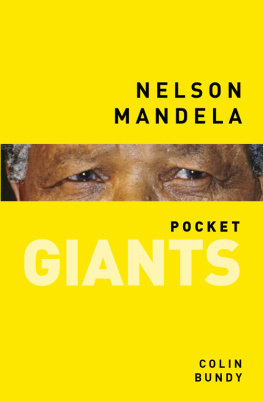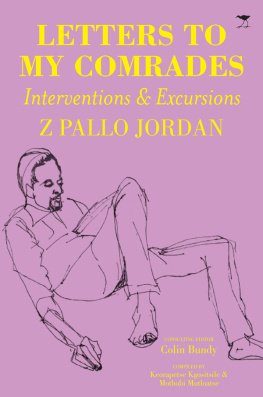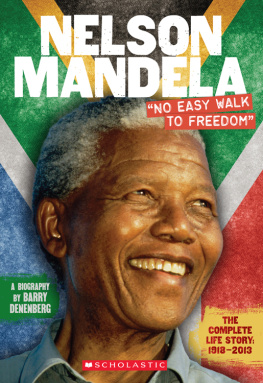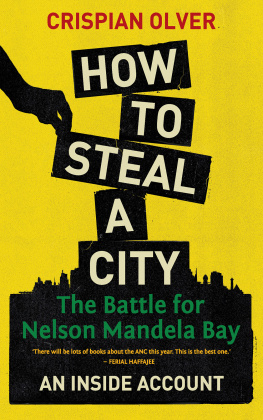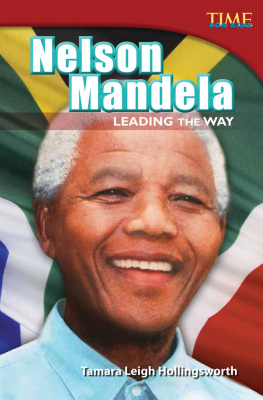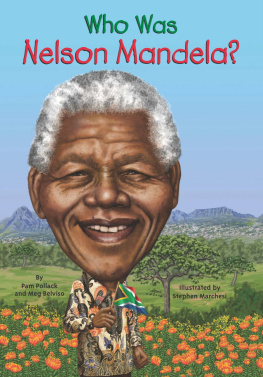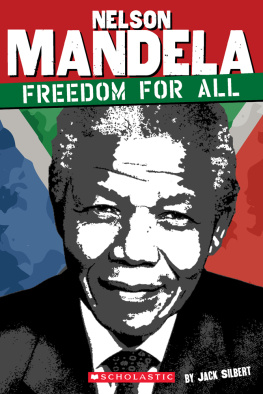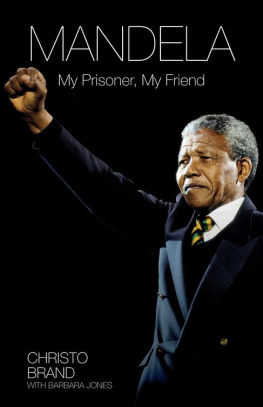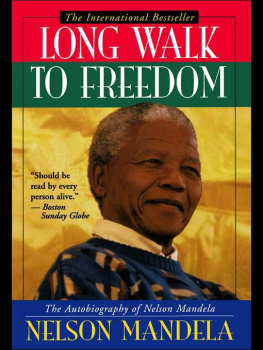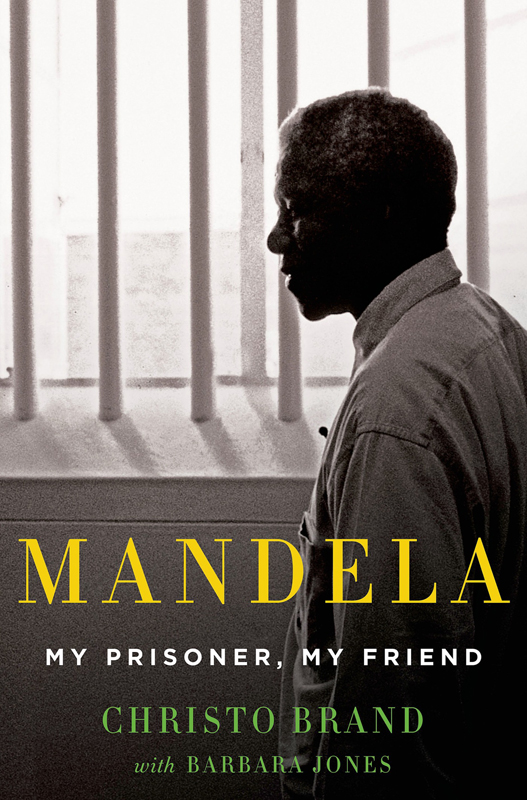Contents
Guide

The author and publisher have provided this e-book to you for your personal use only. You may not make this e-book publicly available in any way. Copyright infringement is against the law. If you believe the copy of this e-book you are reading infringes on the authors copyright, please notify the publisher at: us.macmillanusa.com/piracy.
CONTENTS
On behalf of our family, were deeply humbled to stand where men of such courage faced down injustice and refused to yield. The world is grateful for the heroes of Robben Island, who remind us that no shackles or cells can match the strength of the human spirit.
US President Barack Obamas message in the visitors book on Robben Island, 30 June 2013.
My heartfelt thanks for support and encouragement in writing this book go to: Linda Duvenhage, the heritage researcher on Robben Island who inspired me to start the project several years ago when we worked together; Samiena Amien, a member of Ahmed Kathradas extended family, who first put pen to paper for me; Dr James Sanders, the researcher for Mandelas authorised biography, who introduced me to Barbara Jones, my fellow writer; Verne Harris and Sahm Venter of the Nelson Mandela Foundation, who advised and supported us throughout; photographers Mark Skinner, who kindly allowed me to use his beautiful portrait of Mandela with Kathrada, and Given Kokela who took some special pictures of President Obama when he visited Robben Island in June, 2013; David Denborough, at the Dulwich Centre in Adelaide, Australia, provided valuable source mterial from his narrative therapy library which can be accessed at www.dulwichcentre.com.au.
Most of all I am grateful to my dear mentor and ex-prisoner Ahmed Kathrada, who has written the foreword. This has taken us both back to painful times but these are now thankfully overtaken by our special bond of friendship today.
Ahmed Kathrada was, alongside Nelson Mandela, sentenced to life in prison in 1964 at the Rivonia Trial. He was imprisoned for 25 years and since his release he has served as a Parliamentary Counsellor to Nelson Mandela and as the chairperson of the Robben Island Museum Council. In 2004 he was voted 46th in SABC3s 100 Greatest South Africans.
My lasting impression of Christo Brand is that hes a very good human being. Hes not a politician; hes just a very caring man who took chances for other people, which could have brought him trouble.
While his book naturally focuses on his relationship with Madiba while he was a prisoner, I too experienced the humanity of Christo while I was in prison. I did not really encounter him on Robben Island where I began serving my life sentence, with Madiba, from 13 June 1964. It was only after I was transferred to the mainland, to Pollsmoor Prison in October 1982, that I really had a lot of dealings with Christo.
We all realised that this was a good man, someone who could help us, but we were warned by Madiba not to take advantage of young warders and get them into trouble. He was asking us not to use Christo for political things, like sending political messages and so forth, and so he didnt do that for us. But he did many other things.
One of my lasting memories of Christos difference to the brutish warders we had been used to before was at the time I was allowed to start having legal visits from Advocate Dullah Omar. We had been trying to see each other for quite some time and I got my chance when, after I had finished my two Honours Degrees through the University of South Africa, the prison authorities would not let me register for a Masters Degree. So I said I was going to take the matter to court and asked to see Dullah.
On one of his first visits, Dullah brought samoosas two packets one for the warders and, once the warders accepted theirs, he asked if I could have the other packet. Christo obliged. At this time, Dullahs wife, Farida, was running a fruit and vegetable stall at Salt River Market in Cape Town, so we then arranged for Christo to go to her and collect fruit from her for us she also gave him fruit and vegetables for his own family. Next, Dullah started arriving for legal visits with his lawyers bag packed full of food; not a legal book in sight. Christo knew it and he let it go.
Even better than that was the extra visits he allowed me to have. Christo arranged visits from people I was not ordinarily allowed to see, such as Professor Fatima Meer, other political activists and extra family members. I will never forget the day when a niece of mine was married in Cape Town and Christo organised for virtually the entire wedding party to visit me, illegally, in prison. He set up a special visiting place upstairs and I saw them all, kids and adults. With the kids, it was one or two minutes I was allowed to see each of them. They filed into the room and brought with them laughter and light, a rare and glorious sight for a prisoner. I got to spend a little more time with the adults, again one by one.
He also took me to see political activists who were detained at Pollsmoor Prison, which was in a way more dangerous for him than it was for me. It was the 1980s and the time of the State of Emergency, when thousands of anti-apartheid activists were detained throughout the country. Many of the Western Cape and even some Eastern Cape activists were detained at Pollsmoor. Their own families did not know where they were or how they were faring, but Christo let me see them. One day, he took me to see Trevor Manuel who was not allowed any visitors at all. Trevor, who later became Finance Minister under Madiba and other presidents, had already been in solitary confinement for two years when Christo took me to his prison cell.
It was a big thing for Trevor to have me there speaking with him. In prison, we had been hidden from the world for two decades. Only old photos of us, much younger, were available and even then it was a criminal offence to possess them. One can imagine the impact of our visit to him during which I passed on greetings from Madiba and Walter Sisulu, among others; it really boosted his spirits. Christo also let me give him an inspiring poem at one stage. On another occasion, he took me to see Matthew Goniwe, an Eastern Cape activist who was killed by the security police after his release.
Isolated as we were in prison, we were very ignorant about AIDS, and Christo once told us seven ANC guerrillas who were HIV positive had been captured and brought from Angola. One day, when we were outside, they rushed to us and embraced us. We worried afterwards that we might have caught it from being hugged by them. Later, after we had been locked in our cells for the night, we happened to see Christo, walking with these fellows with his arm around them, up and down the courtyard. That image with Christo and the HIV positive prisoners, along with that of Princess Di when we saw her on television with an HIV positive child, broke our suspicions about HIV, especially when I saw how comfortable he was with these chaps.
Because of the difficulty of communications with the other activists in prison, we used to stand under their cells and talk, so that they would be able to hear what we were talking about. It was our way of passing on information to them. In another small show of humanity, Christo was aware of what we were doing and he didnt do anything to stop us. When we were eventually transferred to a Johannesburg prison in October 1989, just days before our release, I had two televisions. I left one with Christo for these prisoners and he gave it to them. The other, he kept in his garage for me and gave it to me when I came back to Cape Town as a Member of Parliament, five years later.


